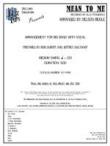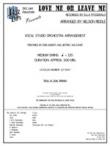NICE WORK IF YOU CAN GET IT [DOWNLOAD]
Recorded by Ella Fitzgerald
Arranged by Nelson Riddle, Prepared by Rob DuBoff and Jeffrey Sultanof

Cat #: JLP-9422-DL
$75.00This product is available for immediate download after purchase.
Questions?
Please call +1-518-587-1102 or email us.
Edition: Jazz Studio Orchestra Arrangement with Vocal
Description: Swing - Medium
Publisher: Jazz Lines Publications
Of all of Ella Fitzgerald's songbook albums, the one that seems to get revisited the most is her 1959 recording "Ella Fitzgerald Sings the George and Ira Gershwin Song Book." Perhaps this is due to the continually endearing nature of the source material, but it is likely that Nelson Riddle's brilliant interpretations of said source material only helped to make this one of Fitzgerald's most memorable endeavors. The lush nature of Riddle's arrangement of "Nice Work If You Can Get It" is a prime example of his creative powers at their peak.
Ironically enough, the beginning barely counts as an arrangement at all. Herb Ellis' guitar gently accompanies Fitzgerald's delicate treatment of the verse until the orchestra kicks into tempo at measure 9. A somewhat mysterious descending unison flute (and one oboe) line is underpinned by a similarly mysterious descending tremolo from the strings, harp and celeste as the drums set up the gentle medium swing pace.
Most of the first two A sections feature Fitzgerald singing the melody accompanied by gentle and simple backgrounds from the winds and strings. The bridge sees two bass clarinets offering up a typically cutesy Riddle countermelody at measure 39. The band returns to more gently prodding Fitzgerald's vocals along at measure 47 before the introductory figure returns at measure 55. This time, the horns also play the unison woodwind line to add a little heft to the ensemble sound.
Measure 59 marks the beginning of the shout section, where the melody gets passed back and forth between the strings and woodwinds. The intensity level should be slightly higher to avoid monotony, but the volume level should never exceed a medium loud. Fitzgerald re-enters on the bridge at measure 75 with some recycled backgrounds and counter-lines, with the slightly elongated melody leading into the introductory figure returning once again at measure 92. The woodwinds and horns are unison as before, with the arrangement finishing on a single low C played in unison by the bass trombone and bass.
This arrangement is for studio orchestra featuring female vocalist. This is not a transcription - it has been prepared from Nelson Riddle's original score. The vocal key is C.
Vocal
Woodwind 1: Flute
Woodwind 2: Flute
Woodwind 3: Flute/Bass Clarinet
Woodwind 4: Oboe/Clarinet/Bass Clarinet
2 Horns in F
3 Trombones
Bass Trombone
3 Violins
Viola
3 Celli
Harp
Guitar
Celeste/Piano
Bass
Percussion: Bells/Vibraphone
Drums
Trombone 1: C5








